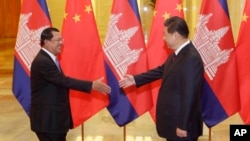Opposition members say they want aid money from China to be transparent.
China recently pledged between $500 million and $700 million for Cambodia, but it is not clear where the money will be spent.
Opposition officials worry excessive debt to foreign countries, including China, could drag down Cambodia’s economic growth.
“If we depend on aid money to be able to govern the country, that means we can lose part of our economic independence,” Son Chhay, a lawmaker for the Cambodia National Rescue Party, said.
He criticized borrowing money to build new buildings like the headquarters of the Council of Ministers “for $50 million,” which provides no economic benefit. “So it makes us poorer,” he said.
Meanwhile, China is pursuing mining in Preah Vihear and Mondolkiri provinces, and potential petroleum drilling in the Gulf of Thailand, when Cambodia should use these to its own economic advantage, he said.
Sok Touch, dean of Khemarak University, said Chinese aid comes with “no strings attached,” but it also has no benchmarks for reform, such as in human rights or the judiciary, as Western aid does.
“Chinese aid is big, actually, but the quality of the aid, as we have seen, is difficult [to know],” he said. If Cambodia is to grow economically, it needs aid, but it needs transparency and public input on the spending of the aid, he said.
Much of the aid China gives to Cambodia goes back to Chinese companies, which work on aid projects, he said. “That’s the problem.”
Government spokesman Phay Siphan said the government has a debt ceiling it uses to manage borrowing according to GDP growth. And Cambodia is strengthening its economy ahead of Asean integration next year, he said. Roads, bridges, electricity and water have been priorities, he said, and now human resources will be a focus.
China’s aid pledge came during a trip by Prime Minister Hun Sen to China, where he maintains strong relations. Cambodia needs about $1 billion each year in aid to operate. Its foreign debt is currently around $9 billion. The latest budget, for 2015, requires nearly $4 billion—a quarter of that going to defense and security.
Son Chhay said the country can do with less aid if it does better collecting money for itself, in taxes and in shoring up corrupt practices by government officials. Payments to “ghost” public employees, lost revenue from ticket sales at Angkor Wat and lost money from at least 46 different casinos could all help shore up that money, he said.
Peter Maguire, an American law professor and author who follows Cambodia closely, said aid money often just disappears.
“I don’t think they deserve more aid money,” he said. “If it was to develop the infrastructures in the country, it would be wonderful, but very often the money doesn’t make it where it is supposed to go.”




